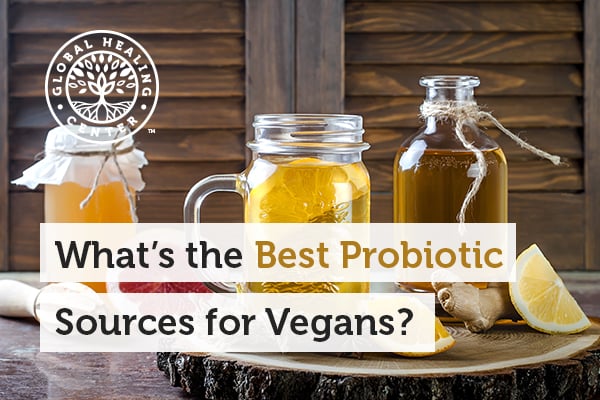
Your gut is home to good and bad bacteria, and maintaining that balance is more important than you think. Sure, maybe you already know taking probiotics (the “good” bacteria) can promote healthy digestion, but did you know recent studies suggest even more positives, like an immune system boost and mental health support? [1] [2] If you’re feeling a little rundown and you’re not sure why, maybe probiotics could help.
Vegan Probiotic Sources
But how can you get those probiotics from a vegan diet? Because veganism cuts out all animal products, proper nutrition — especially for the new vegan — can be tricky. [3] If you’re planning on getting your probiotics from food sources, there are some options out there that aren’t exactly vegan-friendly. For example, dairy-based yogurt is no longer an option; however, you can always make or buy your own live-cultured non-dairy yogurt. Coconut milk yogurt is becoming more common in the grocery stores today, and are a much better option (health-wise) than soy-based yogurts.
Here are some vegan foods that you can try right now that are also high in naturally-occurring probiotics:
Pickled/Fermented Vegetables
A well-known choice is certainly the traditional pickle, but any vegetable that’s been pickled or fermented with bacterial cultures (in addition to salt and spices) can be a great probiotic source. Kimchi, for example, is an excellent probiotic choice for this reason. Always keep in mind, though, pickled and fermented vegetables can contain high levels of sodium.
Kombucha Tea
Fermented from black tea, kombucha also has sugar, yeast, and — you guessed it — probiotics. It’s a popular item in stores right now, but always be sure you’re looking for a product that’s been tested; this helps rule out the presence of “bad” bacteria.
Fermented Soy Products
Most of you have probably heard of fermented soy products like miso and tempeh. And as many sources of B12 are in non-plant based foods, many vegans might find it difficult to get enough of the vitamin. [4] Tempeh, an excellent substitute for tofu, is also a reliable source of B12. [5] [6]
One Final Thought

As one of the healthiest diet options, veganism can be extremely rewarding for your health. A poorly planned vegan diet, however, can definitely be nutritionally deficient. Finding reliable probiotic sources — like the ones listed above — can help with that, as can a good vegan supplement.
A daily probiotic supplement is a reliable way to get consistent probiotic support. Currently, I recommend and use two different products: Latero-Flora™ which is the B.O.D. Bacillus Laterosporus strain and a more advanced formula, Global Healing's Ultimate Probiotic, which contains active cultures from 23 different probiotic strains. Either of these are a solid choice and I’ve been extremely satisfied with them both.
References (6)
- Behnsen, J. et al. Probiotics: Properties, Examples, and Specific Applications. Cold Spring Harbor Perspectives in Medicine.
- Foster, J.A. & McVey-Neufeld, K.A. Gut-brain axis: how the microbiome influences anxiety and depression. Trends in Neurosciences. 36 (5).
- Key, T. J. et al. Health effects of vegetarian and vegan diets. Proceedings of the Nutrition Society. 65 (1).
- Antony, A. Vegetarianism and vitamin B-12 (cobalamin) deficiency. The American Journal of Clinical Nutrition. 78 (1).
- Liem, I. T. et al. Production of vitamin B-12 in tempeh, a fermented soybean. Applied and Environmental Microbiology. 34 (6).
- Areekul, S. et al. The source and content of vitamin B12 in the tempehs. Journal of the Medical Association of Thailand. 73 (3).
†Results may vary. Information and statements made are for education purposes and are not intended to replace the advice of your doctor. If you have a severe medical condition or health concern, see your physician.



